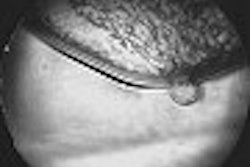A group of hospitals in the U.K. has launched a study of the effectiveness of computer-aided detection (CAD) in a mammography screening environment. The goal of the study, called the CADET Trial, is to determine whether CAD technology can help the U.K. healthcare system stave off a looming crisis as more women enter breast screening programs in the near future.
The researchers hope to see if a single radiologist working with CAD can achieve the level of detection currently offered by double reading with arbitration, in which two radiologists read films independently, with referral to a third radiologist if their interpretations differ.
The U.K.’s NHS Breast Screening Programme already suffers from a shortage of radiologists and radiographers, and the system will see resources strained even further due to several factors: an extension of the age range of women eligible for screening; the aging of the baby boom generation; and the new requirement in England and Wales that all mammograms include two views of each breast.
The CADET Trial will study the ImageChecker CAD workstation developed by R2 Technology of Sunnyvale, CA. The institutions participating in the study include the University of Aberdeen, the University of Manchester, Queen Mary College in London, and South Manchester University Hospitals Trust. The study is being funded by Cancer Research UK and the NHS Breast Screening Programme.
By AuntMinnie.com staff writersSeptember 17, 2003
Related Reading
Screening expected to cut British cancer deaths, September 16, 2003
Waiting time target not met for UK cancer patients, July 30, 2003
Cancer rates decline in European countries: study, July 29, 2003
U.K. group accuses breast cancer screening advocates of disinformation, July 11, 2003
Charity warns of looming breast cancer crisis, July 9, 2003
Copyright © 2003 AuntMinnie.com



















